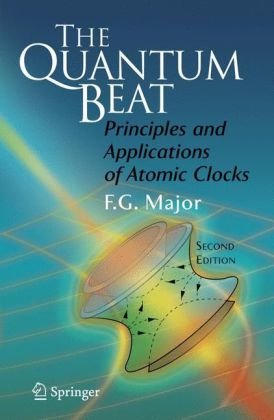

Most ebook files are in PDF format, so you can easily read them using various software such as Foxit Reader or directly on the Google Chrome browser.
Some ebook files are released by publishers in other formats such as .awz, .mobi, .epub, .fb2, etc. You may need to install specific software to read these formats on mobile/PC, such as Calibre.
Please read the tutorial at this link: https://ebookbell.com/faq
We offer FREE conversion to the popular formats you request; however, this may take some time. Therefore, right after payment, please email us, and we will try to provide the service as quickly as possible.
For some exceptional file formats or broken links (if any), please refrain from opening any disputes. Instead, email us first, and we will try to assist within a maximum of 6 hours.
EbookBell Team

4.8
34 reviews
ISBN 10: 1441924124
ISBN 13: 9781441924124
Author: Fouad G. Major
Intended for nonspecialists with some knowledge of physics or engineering, The Quantum Beat covers a wide range of salient topics relevant to atomic clocks, treated in a broad intuitive manner with a minimum of mathematical formalism. Detailed descriptions are given of the design principles of the rubidium, cesium, hydrogen maser, and mercury ion standards; the revolutionary changes that the advent of the laser has made possible, such as laser cooling, optical pumping, the formation of "optical molasses," and the cesium "fountain" standard; and the time-based global navigation systems, Loran-C and the Global Positioning System. Also included are topics that bear on the precision and absolute accuracy of standards, such as noise, resonance line shape, the relativistic Doppler effect as well as more general relativistic notions of time relevant to synchronization of remote clocks, and time reversal symmetry. This edition retains the essentially didactic approach to the treatment of the development of atomic clocks in the first edition, but brings up to date the extraordinary developments in recent years, culminating in clocks based on quantum resonance at optical frequency in individual ions confined in miniature electromagnetic traps. These, together with advances in the generation of wide-band coherent frequency combs spanning the spectrum as far as the optical range, has made possible the direct measurement of phenomena occurring at optical frequencies! As a result of these recent advances, in addition to the time-based GPS and LORAN C navigation systems treated in the first edition, other important applications of a fundamental scientific interest have become feasible. These include satellite-borne tests of the theory of general relativity and the equivalence principle on which it is based.
Chapter 1 Celestial and Mechanical Clocks
Chapter 2 Oscillations and Fourier Analysis
Chapter 3 Oscillators
Chapter 4 Quartz Clocks
Chapter 5 The Language of Electrons, Atoms, and Quanta
Chapter 6 Magnetic Resonance
Chapter 7 Corrections to Observed Atomic Resonance
Chapter 8 The Rubidium Clock
Chapter 9 The Classical Cesium Standard
Chapter 10 Atomic and Molecular Oscillators: Masers
Chapter 11 The Hydrogen Maser
Chapter 12 The Confinement of Particles in Fields
Chapter 13 Isolated Ion Clock: A New Approach
Chapter 14 Optical Frequency Oscillators: Lasers
Chapter 15 Laser Systems
Chapter 16 Laser Cooling of Atoms and Ions
Chapter 17 Application of Lasers to Microwave Standards
Chapter 18 Optical Standards and Measurement
Chapter 19 Applications: Time-Based Navigation
Chapter 20 Atomic Clocks and Fundamental Physics
the principles of quantum computing
the principles of quantum mechanics
the principles of quantum mechanics 4th edition
the quantum theory and reality
the quantum brain
Tags: Fouad Major, Quantum, Principles, Applications